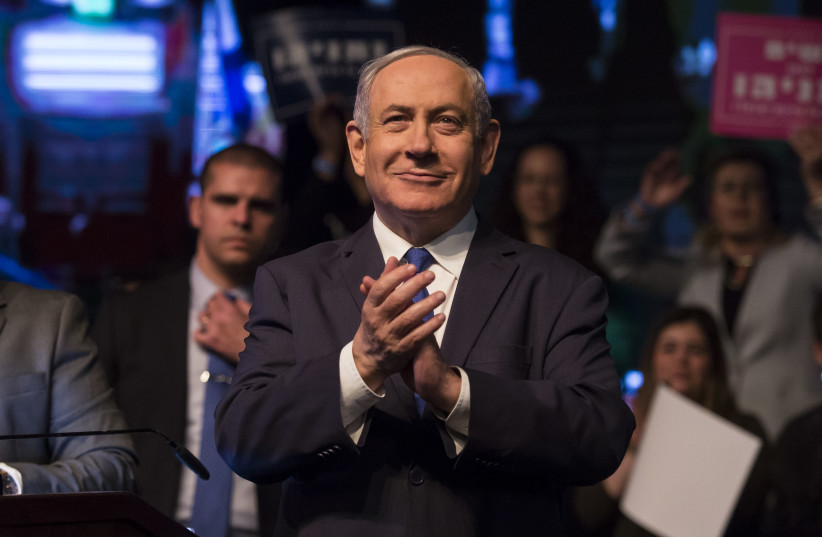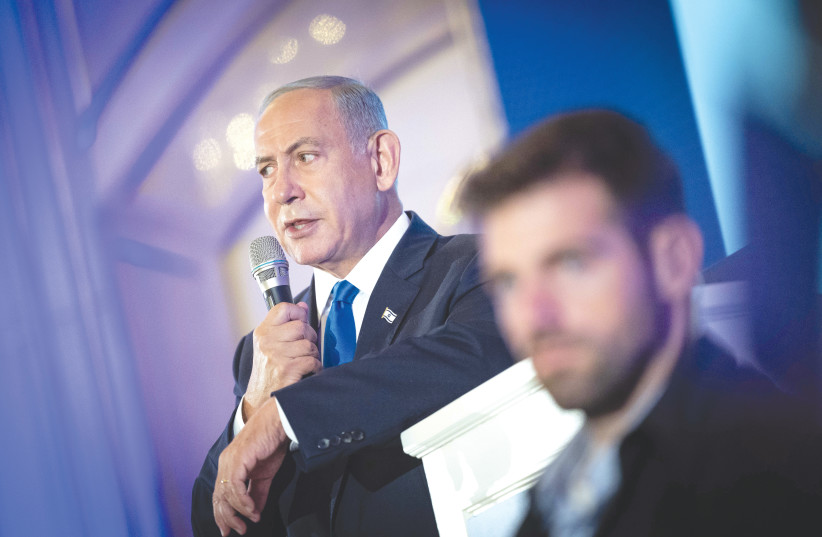No. 5 on The Jerusalem Post’s Top 50 Most Influential Jews of 2022: Israeli opposition leader and former prime minister Benjamin Netanyahu.

The year 5782 began and ended with Benjamin Netanyahu as opposition leader, which means that, necessarily, his influence has waned from its peak.
The politician once known as “King Bibi” was relegated from the center stage to the occasional secondary Knesset speech.
His trademark PowerPoint presentations on the Iranian nuclear threat went from prime–time TV to Facebook Live. Except for a trip to London at the invitation of Conservative Friends of Israel, his jet–setting to represent the country has mostly come to a halt, though Fox News is always happy to have him.
To add insult to injury, former US president Donald Trump doesn’t seem to be Netanyahu’s buddy anymore, with the president’s son–in–law and adviser, Jared Kushner, describing Trump’s deep disappointment with him in a recently published memoir.
And yet, Netanyahu continues to cast a very long shadow over the Israeli political scene. With Iran high on Israel’s agenda in recent weeks, Prime Minister Yair Lapid seems to devote time in almost every public statement on the matter, defending his policy on how to counter a nuclear deal as better than Netanyahu’s more aggressive one from 2015.

Netanyahu’s influence continues in Israel ahead of elections
Netanyahu’s machinations, combined with the seemingly limitless and exceptionally vocal devotion of his supporters, pulled right–wing lawmakers away from the diverse governing coalition, bringing about its demise in June and the upcoming election in November.
Even though Netanyahu is not running as an incumbent for the first time since 2009, the electoral field is still mostly organized between “Yes Bibi” and “No Bibi.” The party staking its campaign on bringing the sides together, Zionist Spirit, fell apart and its former leader Ayelet Shaked is now running at the helm of the Jewish Home which is polling way below the threshold.
Netanyahu continues to lead the polls
So far, Netanyahu is leading the pack in polls by far, consistently showing to be the leader of the largest party and the candidate viewed as most fit to be prime minister. This is despite the ongoing trials for corruption charges and more recently, a warning that he could be held responsible for the deaths of 45 people at Meron last year.
And while most polls show him still short of the needed 61 MKs for a majority coalition, Netanyahu used the days before parties submitted their final election lists to get feuding factions to merge so that no vote within his bloc goes to waste. He succeeded in getting United Torah Judaism to remain a single party in the election by pledging to increase funding for haredi schools that do not teach math, English or science and even met with Rabbi Zvi Tau from Har Hamor Yeshiva to get his representative in the Knesset, Avi Maoz, to merge with the Religious Zionist Party.
While looking at the packed field of candidates, it is hard not be impressed by the nearly 73-year-old’s stamina. There is barely a day that goes by that he is not in another city, walking the streets or speaking from behind the bulletproof window of the Likud campaign bus.
Netanyahu is going into 5783 as a contender, fighting to return to Balfour, the official residence that was his home for 15 years, 12 of them consecutively, making him Israel’s longest–serving prime minister. Will he set the bar even higher to beat that record? We’ll know in November.
As reported by The Jerusalem Post
